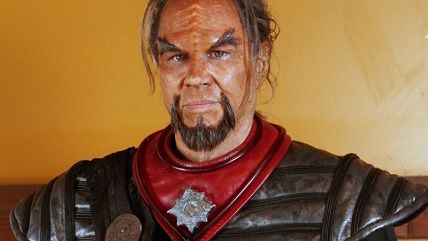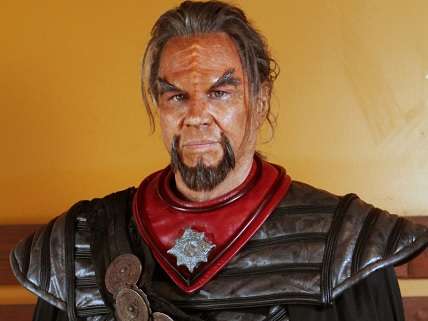Paramount Objects to Klingon Language Amicus Brief by Language Creation Society
It doesn't want to deal with the Klingon language copyrightability issue.


Paramount Pictures, which is embroiled in an expansive copyright lawsuit against Axanar Productions over the latter's Star Trek fan film, has filed an objection to the Language Creation Society (LCS) filing an amicus brief regarding the copyrightability of the Klingon language.
Paramount argues (PDF) the LCS's brief came too late in the process, was too long, and "attempts to have the Court resolve factual issues on a motion to dismiss based on inadmissible hearsay." Hearsay, in this case, refers to the context provided by the LCS for how Klingon has become a "living language."
"It is undisputed that Klingons are copyrightable characters, and have been depicted in the Star Trek Copyrighted Works in a distinct and recognizable manner," Paramount argues in its formal opposition to the brief. Paramount insists that the fictional Klingon language "is part of the depiction" of copyrighted Klingon characters and that it's "the use of the Klingon language in this context that will be before the Court… not the copyrightability of languages in general."
Irrespective of that, Paramount adds, the issue of whether Klingon is copyrightable "is certainly not before the Court on the present motion to dismiss."
In their response (PDF), the LCS's attorneys, led by Marc Randazza, a First Amendment lawyer and friend of Reason who is representing the LCS pro bono, point out that the standard for the admissibility of an amicus is "simply whether it will assist the Court."
"The evidence and arguments provided by Amicus Language Creation Society's brief will assist the Court in determining the question of whether the Klingon language is entitled to copyright protection," LCS's reply argues. "It is not premature for the Court to make this determination at the motion to dismiss stage because this is a legal question; if a spoken language is not entitled to copyright protection as a matter of law, then Plaintiffs' claims are properly dismissed insofar as they are based on Defendants' use of the Klingon language."
The LCS's attorneys also dispute Paramount's assertion that they are seeking an advisory opinion.
"Plaintiffs steadfastly assert that they 'own' the Klingon language,and there is no need for a fact-intensive 'substantial similarity' analysis, as Plaintiffs insist, to determine whether Klingon can belong to anyone," the reply argues. "This issue is properly before the Court, and the Court may properly determine at this stage whether Klingon is copyrightable."
The LCS also points out that between all of Paramount and Axanar's motions, less than two pages focus on the issue of the copyright claim on the Klingon language. It argues that this makes the brief relevant to an issue before the court, and that even if the brief isn't used now, it should be held "for use during later stages in the proceeding," since the issue of Klingon's copyrightability "will need to be dealt with (unless Plaintiff drops their claim to won Klingon) at some point in this case."


Show Comments (46)